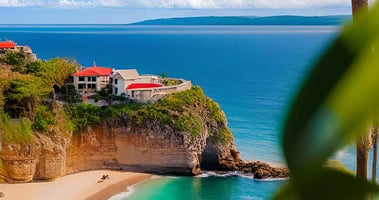In today's ever-changing tourism industry, it's crucial for destination marketing organizations...
Thought Leadership vs. Servant Leadership in Tourism and Hospitality

Leadership is a crucial element in the tourism and hospitality industry, as it plays a vital role in the success of any organization. A strong leader can help create a positive workplace culture, inspire innovation, and guide a team to achieve its goals. In the context of popular tourism and hospitality attractions and economic development in the United States, leadership is even more critical, as it helps organizations stay competitive, attract visitors, and contribute to the local economy.
There are two main types of leadership that are relevant in the context of tourism and hospitality: thought leadership and servant leadership. Thought leadership involves becoming an expert in a specific field and sharing that expertise with others to provide valuable insights and solutions to industry challenges. In tourism and hospitality, thought leaders may be experts in areas such as destination marketing, sustainability, or customer experience.
On the other hand, servant leadership is focused on serving the needs of others, including employees, customers, and the community. It involves prioritizing the needs of others above one's own and empowering team members to achieve their goals. Servant leadership in tourism and hospitality can help create a culture of empathy and compassion, which can enhance the guest experience and foster loyalty among employees and visitors alike.
Both thought leadership and servant leadership are critical in the tourism and hospitality industry, and organizations that embrace these leadership styles are more likely to succeed in today's rapidly changing landscape. By staying up to date with industry trends and best practices and putting the needs of employees, customers, and the community first, tourism and hospitality leaders can create a positive impact that goes beyond their own organization and contributes to the growth and development of the industry as a whole.
Understanding Thought Leadership
In today's constantly evolving tourism and hospitality industry, staying relevant and ahead of the competition is essential. One way to achieve this is by establishing oneself as a thought leader. Thought leadership is a strategy that involves sharing insights and opinions on industry-related topics, which can help establish credibility, authority, and trust among a target audience. In this context, thought leaders are individuals or organizations that have a deep understanding of their industry and are able to share their knowledge in a way that is useful and valuable to others.
Definition of thought leadership
Thought leadership is the process of establishing oneself or an organization as an expert in a particular field or industry. It involves sharing insights, knowledge, and ideas that can help shape the conversation around relevant topics. Thought leaders are typically individuals or organizations that have a unique perspective, experience, or expertise, which they use to influence and guide others within their industry. Thought leadership is a long-term strategy that requires consistency, dedication, and a deep understanding of the industry and its trends.
Examples of thought leaders in tourism and hospitality
There are many examples of thought leaders in the tourism and hospitality industry. For instance, TripAdvisor is a travel website that has established itself as a thought leader in the industry by providing user-generated reviews and insights that help travelers make informed decisions. Similarly, Airbnb has emerged as a thought leader in the hospitality industry by disrupting the traditional hotel model and offering unique and personalized experiences to travelers. Other examples of thought leaders in tourism and hospitality include travel bloggers, industry analysts, and destination marketing organizations (DMOs) that provide valuable insights and information to travelers and industry professionals.
Benefits and drawbacks of thought leadership
The benefits of thought leadership are numerous. By establishing oneself as a thought leader, individuals and organizations can gain credibility and authority within their industry, which can help attract new customers or clients. It can also help increase visibility and brand recognition, which can lead to new opportunities for growth and expansion. Thought leadership can also help establish trust and build strong relationships with a target audience, which can be valuable in the long term.
However, there are also potential drawbacks to thought leadership. For instance, it can be time-consuming and require a significant investment of resources to establish oneself as a thought leader. Additionally, it can be difficult to measure the impact of thought leadership on business outcomes, and there is a risk of becoming too focused on thought leadership at the expense of other important business priorities. Furthermore, thought leadership requires a high level of expertise and knowledge, which can be challenging to maintain over time.

Understanding Servant Leadership
In recent years, there has been a growing interest in servant leadership in the tourism and hospitality industry. Servant leadership is a philosophy that places the needs of others above the leader's own self-interest. It is about leading through service, humility, and a commitment to the growth and development of others. In this section, we will explore the definition of servant leadership, examples of servant leaders in the tourism and hospitality industry, and the benefits and drawbacks of this leadership style.
Definition of Servant Leadership
Servant leadership is a leadership philosophy that emphasizes the importance of serving others. This leadership style is based on the idea that leaders should prioritize the needs of their team members and stakeholders, rather than their own self-interest. A servant leader leads by example and puts the needs of others first. They are committed to the growth and development of their team members and work to create a supportive and empowering environment
Examples of Servant Leaders in Tourism and Hospitality
Many leaders in the tourism and hospitality industry embody the principles of servant leadership. For example, the CEO of Four Seasons Hotels and Resorts, J. Allen Smith, is known for his commitment to employee empowerment and development. He has implemented programs such as the Four Seasons University, which provides training and development opportunities to employees at all levels of the organization.
Another example of a servant leader in the industry is Arne Sorenson, the former CEO of Marriott International. Sorenson was known for his commitment to diversity and inclusion, and his efforts to create a supportive and inclusive culture within the company. He was also a strong advocate for sustainability and social responsibility.
Benefits and Drawbacks of Servant Leadership
Servant leadership has many benefits in the tourism and hospitality industry. When leaders prioritize the needs of their team members and stakeholders, they can create a supportive and empowering environment that fosters creativity and innovation. This can lead to higher levels of employee engagement and productivity, and ultimately, better business results.
However, servant leadership also has some drawbacks. For example, some leaders may struggle to balance the needs of their team members with the needs of the organization. In addition, some may view servant leadership as a "soft" leadership style that is not effective in driving results. It is important for leaders to find the right balance between serving others and achieving business goals.
In conclusion, servant leadership is an important philosophy in the tourism and hospitality industry. By putting the needs of others first, leaders can create a supportive and empowering environment that fosters growth and development. However, it is important to recognize the potential drawbacks of this leadership style and find the right balance between serving others and achieving business goals.

Thought Leadership vs. Servant Leadership in Destination Marketing
When it comes to leadership in popular tourism and hospitality attractions, there are two approaches that DMOs can take: thought leadership and servant leadership. Both approaches have their advantages and disadvantages, and choosing the right approach can make a big difference in the success of a tourism destination.
Case Study of a Popular Tourist Destination that Exhibits Thought Leadership
One example of a popular tourist destination that exhibits thought leadership is Las Vegas. The Las Vegas Convention and Visitors Authority (LVCVA) has been recognized for its thought leadership initiatives, such as the development of a groundbreaking research program that analyzed visitor data to help better understand customer behavior and preferences. The LVCVA has also been praised for its innovative marketing campaigns, which have helped to establish Las Vegas as a leading destination for entertainment and hospitality.
Case Study of a Popular Tourist Destination that Exhibits Servant Leadership
Another example of a popular tourist destination that exhibits servant leadership is Jackson Hole, Wyoming. The Jackson Hole Chamber of Commerce has been recognized for its commitment to servant leadership, which is reflected in its efforts to promote sustainable tourism and preserve the natural beauty of the area. The chamber has worked with local businesses to develop sustainable practices, such as energy-efficient lighting and recycling programs. They also offer educational programs for visitors on how to reduce their impact on the environment while enjoying the destination.
Comparison of the Two Approaches
While both thought leadership and servant leadership have their advantages, they differ in their approach to leadership. Thought leadership focuses on establishing a destination as a leader in the industry through innovation, research, and sharing of expertise. Servant leadership, on the other hand, emphasizes collaboration, community building, and a focus on sustainability and ethical practices.
Ultimately, the choice between the two approaches depends on the goals of the destination and the values of the community. A DMO may choose to focus on thought leadership to establish their destination as a leader in the industry, while another may prioritize servant leadership to promote sustainable tourism and community engagement. Both approaches can be successful, but it's important to choose the one that aligns with the values and priorities of the destination and its stakeholders.

Thought Leadership vs. Servant Leadership in Economic Development
In the context of economic development, thought leadership and servant leadership are two approaches that can have a significant impact on a city or region's ability to grow and prosper. Thought leadership can involve innovative ideas and strategies that help to position a city or region as a leader in a particular industry or area of expertise, while servant leadership focuses on the needs of the community and the importance of collaboration and partnership.
Case Study: Thought Leadership in Economic Development
Seattle, Washington is an example of a city that has exhibited thought leadership in economic development. In the early 2000s, the city's leaders recognized the potential of the tech industry and made a concerted effort to attract tech companies and talent to the area. This involved initiatives such as tax breaks for tech companies and investments in infrastructure, including the expansion of the light rail system.
These efforts have paid off, with Seattle now home to some of the biggest tech companies in the world, including Amazon and Microsoft. The city has also seen significant job growth and economic development in other industries, such as healthcare and biotech. Seattle's success in economic development can be attributed in part to its thought leadership approach, which prioritizes innovation and strategic thinking.
Case Study: Servant Leadership in Economic Development
In contrast, Asheville, North Carolina is an example of a city that has exhibited servant leadership in economic development. The city has placed a strong emphasis on community engagement and collaboration in its economic development initiatives, with a focus on supporting local businesses and entrepreneurs. This has involved initiatives such as the creation of a small business incubator and the establishment of a microloan program for local businesses.
As a result of these efforts, Asheville has seen significant growth in its creative industries, such as craft brewing and artisanal food production. The city's approach to economic development has prioritized the needs of the community and has fostered a sense of collaboration and partnership.
Comparison of Thought Leadership vs. Servant Leadership in Economic Development
While thought leadership and servant leadership are two distinct approaches to economic development, they can both be effective in achieving economic growth and prosperity. Thought leadership can be effective in positioning a city or region as a leader in a particular industry or area of expertise, while servant leadership can prioritize the needs of the community and foster collaboration and partnership.
Ultimately, the choice between thought leadership and servant leadership may depend on the specific needs and goals of a city or region. Some cities may prioritize innovation and strategic thinking, while others may prioritize community engagement and collaboration. By understanding the benefits and drawbacks of each approach, economic development leaders can make informed decisions about how to approach economic growth and prosperity.

In summary, thought leadership and servant leadership are two different approaches to leadership in tourism and hospitality. While thought leadership emphasizes expertise, innovation, and influence, servant leadership emphasizes service, empathy, and collaboration. Each approach has its benefits and drawbacks, and the effectiveness of either approach depends on the specific context and goals of the organization.
Thought leadership may be more effective in situations where the organization is trying to establish itself as a leader in the industry, attract attention and investment, or drive innovation. On the other hand, servant leadership may be more effective in situations where the organization is focused on community engagement, stakeholder collaboration, and sustainable development. However, it is important to note that these are not mutually exclusive approaches, and a combination of both thought leadership and servant leadership may be most effective in achieving the desired outcomes.
Leadership is crucial for success in the tourism and hospitality industry, as it helps organizations navigate a complex and rapidly changing landscape, build relationships with stakeholders, and create value for visitors and the community. Whether an organization chooses to adopt a thought leadership or servant leadership approach, it is important to be transparent, ethical, and focused on creating positive impacts for all stakeholders involved. By doing so, organizations can achieve their goals and contribute to the sustainable development of the industry.



